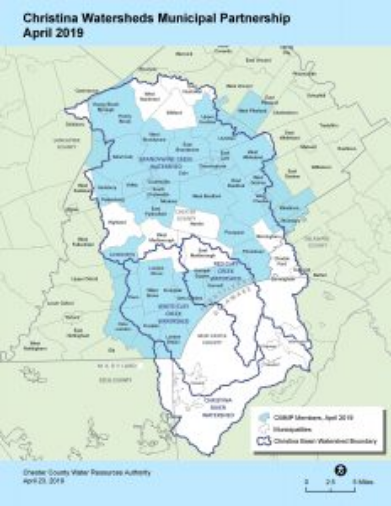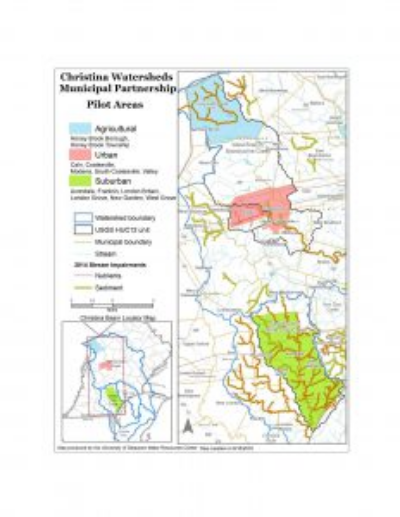CWMP and MS4 Programs
The Brandywine Red Clay Alliance partners with municipalities, agencies, and watershed conservation organizations to restore stream water quality and promote public education about the municipal stormwater program.
Christina Watersheds Municipal Partnership (CWMP)
Mission
The Christina Watersheds Municipal Partnership (CWMP) is a long-term partnership of Pennsylvania municipalities, county agencies, and watershed conservation organizations. The mission of CWMP is to facilitate and support engagement and collaboration of Pennsylvania municipalities, landowners, and other stakeholders to restore and protect the water quality of streams in the Brandywine Creek, Red Clay Creek and White Clay Creek watersheds.
The CWMP is a collaborative of 38 municipalities in the Brandywine, Red Clay, and White Clay watersheds in Pennsylvania
Beneficial outcomes
Since 2003, this Partnership has provided broad based collaborative education and MS4 regulatory planning and coordination efforts to 38 municipalities and private, non-profit, and government partners in the PA portion of the Christina Basin. The CWMP coordination efforts have achieved significant cost savings and improved consistencies for MS4 municipalities through information sharing, tools and templates, and facilitation of collaborative planning, among other services, and assisted them with watershed-based approaches to regulatory compliance. In recent years, CWMP has assisted municipalities in preparing pollutant reduction and TMDL plans, and for the past two years, has also facilitated 3 pilot areas of multi-municipal collaboration planning in the Brandywine Creek and White Clay Creek watersheds.
Pilot Projects
Three different landscapes; agricultural, urban and suburban, have been selected to pilot a multi-municipal collaborative concept to meet the requirements for TMDL planning in Chester County, Pennsylvania. The landscapes represent different land uses and degrees of impervious surface. Our work continues in each of these pilot areas.
Emerging challenges
Over the next five years, the CWMP MS4 municipalities will need to complete the approval process of their pollution reduction planning, and then begin a new era of municipal implementation efforts, with the associated financial, regulatory, logistical, and operational uncertainties. This transition to implementation will continue to benefit from flexible and responsive coordination among the partners, and clear communication between the partners and Pennsylvania DEP, to address challenges as they emerge and to most effectively and expeditiously begin reducing pollution within the Christina watersheds.
For a full list of emerging challenges and accomplishments visit CWMP Organizational Description and Services.
CWMP Project funders
National Fish and Wildlife Foundation
CWMP Contact Information:
For more information about CWMP, please contact Brian Winslow BRC’s Watershed Conservation Director.


MS4 Stormwater
What is the MS4 Stormwater Program?
The BRC partners with 32 local municipalities to implement the Public Education and Public Participation part of their MS4 (Municipal Separate Storm Sewer System) Stormwater Program.
Untreated or uncontrolled stormwater runoff is the number one cause of impairment in our local waterways.
Polluted runoff is often transported through municipal stormwater systems where it is eventually discharged into streams untreated. The Environmental Protection Agency (EPA) has established a municipal stormwater management program known as the MS4 Program that is intended to improve our nation’s waters by reducing the quantities of pollutants that stormwater picks up and carries into the storm sewer systems during a storm event.
As part of the MS4 Program, your municipality holds a permit to discharge their stormwater into local waterways. This permit requires the municipality to design a stormwater management program that reduces the discharge of pollutants to the maximum extent possible, that protects water quality and that satisfies the water quality requirements of the Clean Water Act. In Pennsylvania, the MS4 program is administered by the Department of Environmental Protection (DEP).
The MS4 stormwater management program has six elements termed “minimum control measures” which when implemented should result in significant reduction in pollutants discharged into receiving waters.
The BRC and our local municipalities are committed to improving water quality in their watershed through better management of stormwater runoff. Every resident and business owner can participate in their municipal stormwater program by reducing or preventing pollutant runoff from their own property and by reporting any non stormwater discharges into their local waterways.
The six minimum control measures and the actions required by your municipality are outlined below
-
- Public Education and Outreach
Distribute educational materials and conduct outreach to inform citizens about the impacts that stormwater runoff has on water quality. - Public Participation
Provide opportunities for citizens to participate in the stormwater
management program or other programs which improve water quality. - Illicit Discharge Detection and
Develop and implement a plan to detect and eliminate non stormwater discharges into the stormwater system. - Construction Site Runoff
Develop, implement and enforce an erosion and sediment control program for construction site activities that disturb one acre or greater. - Post-Construction Runoff
Develop, implement and enforce a program to address discharges of post-construction stormwater runoff from new development or redevelopment areas. - Pollution Prevention/Good
Develop and implement a program that reduces or prevents pollutant runoff from municipal operations
- Public Education and Outreach